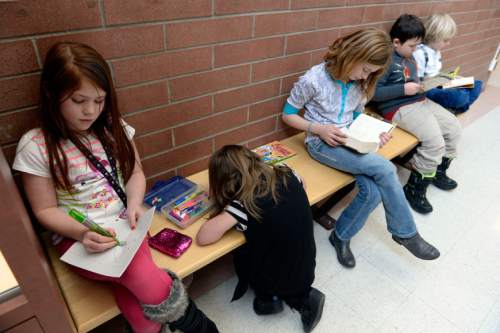This is an archived article that was published on sltrib.com in 2015, and information in the article may be outdated. It is provided only for personal research purposes and may not be reprinted.
Utahns spend the least of all Americans — or near to it — on health care and on food and beverages, according to a new federal report.
The U.S. Bureau of Economic Analysis released Tuesday estimates about how much Americans spent in 2014 for goods and services for their households in a variety of categories.
Utahns paid the least of any state for health care: $4,498 per person.
That was far below the national average of $6,128 per person. The highest spending in any state was $9,303 per capita in Alaska.
Utah ranks so low because it has the nation's lowest average age with its large families and many children, said Pam Perlich, director of demographic research at the University of Utah's Kem C. Gardner Policy Institute.
"The older a person is, the more they spend on health care," she said. "That's both because they tend to need it more — and it's more expensive — and because they qualify for Medicare and have access to medical insurance." Utah simply has a lower percentage of older people.
The report also said Utahns rank third lowest among the states for spending on food and beverages purchased for home use: $2,441 per person.
It was lower only in Oklahoma ($2,289 per person) and Arkansas ($2,351). The national average was $2,780 per capita. And the highest spending was in Vermont ($4,104).
Perlich sees two reasons for that: frugality forced by having larger families, and avoidance of alcohol — which tends to be expensive — by the state's large Mormon population.
"We're a Costco kind of place," Perlich said about Utah. "We have more people per household. So people are more attendant to getting the kind of deals that they need when they are shopping for a larger number of persons."
She added, "There is a stereotype about Utah folks being very frugal," and the data seem to support that.
Also, the large population of Mormons mean fewer people drink alcohol.
"Milk is pretty cheap, and so is Kool-Aid. But when you get to adult beverages, you're talking about real money," Perlich said. Also, because Utahns tend to be younger and have more children, "hopefully the kids are not drinking alcohol — which also keeps spending down on those more expensive adult beverages."
The report also noted that Utah had one of the highest increases in 2014 for overall personal consumption expenditures.
They rose by 5.3 percent, and tied for No. 4 nationally with Oregon. The growth rate was higher only in North Dakota (7.4 percent) and Texas and Colorado (5.7 percent each). The national growth rate was 4.2 percent.
"That's a leading indicator for economic growth," Perlich said.
"It's good to see it going up, especially coming out of a recession because people tend to become very frugal in their spending because of their fears [about the economy during a recession]. When we see people open their wallets and start buying things, it's a good sign" about the economy, she said.



